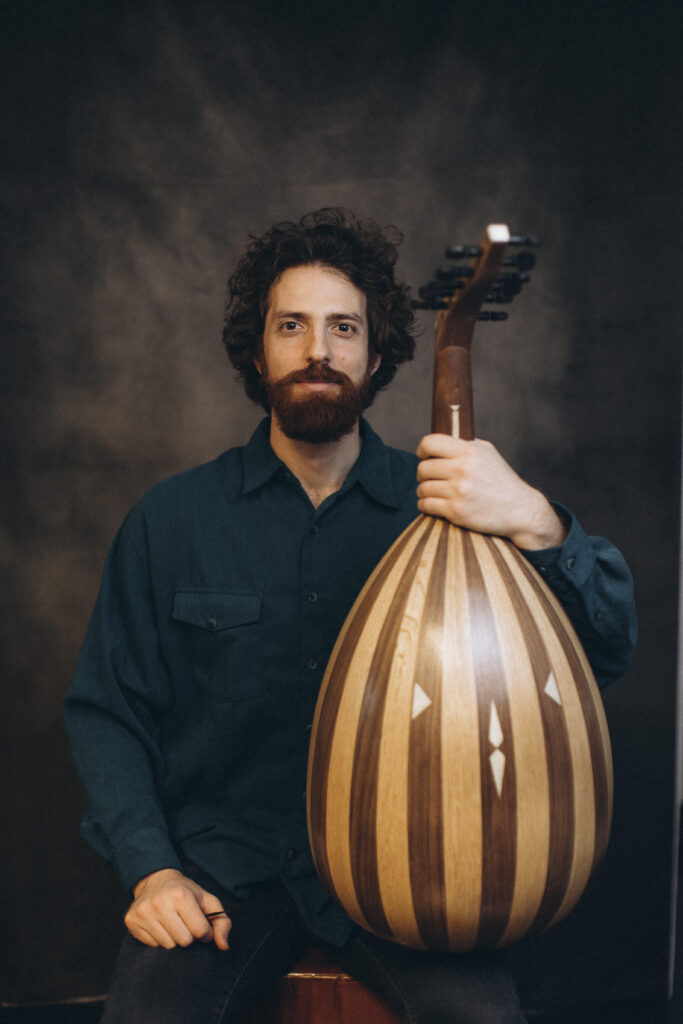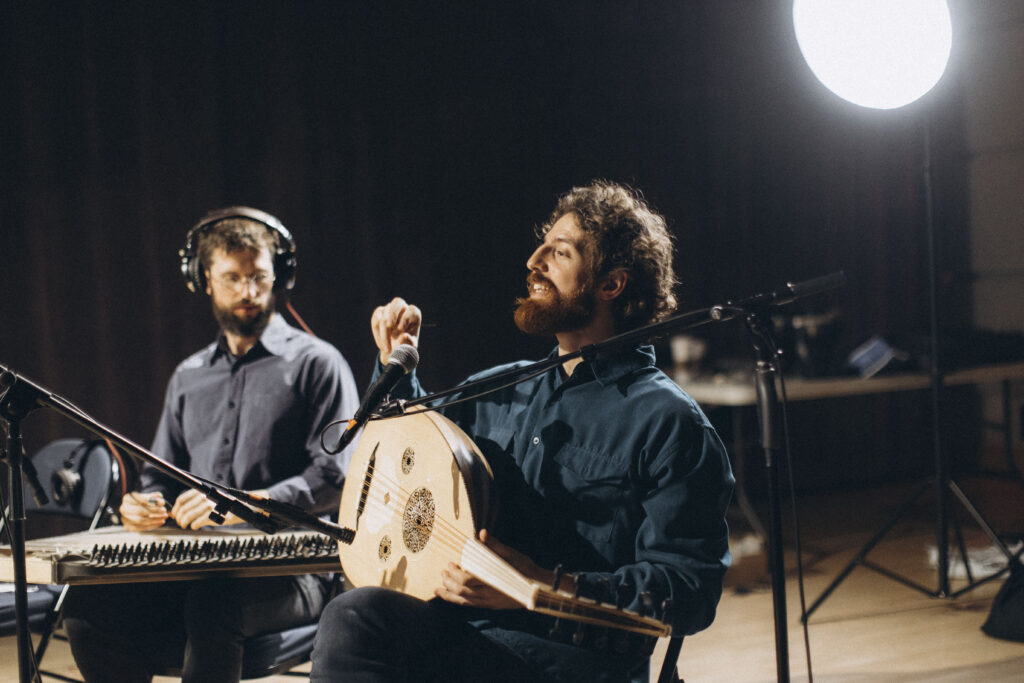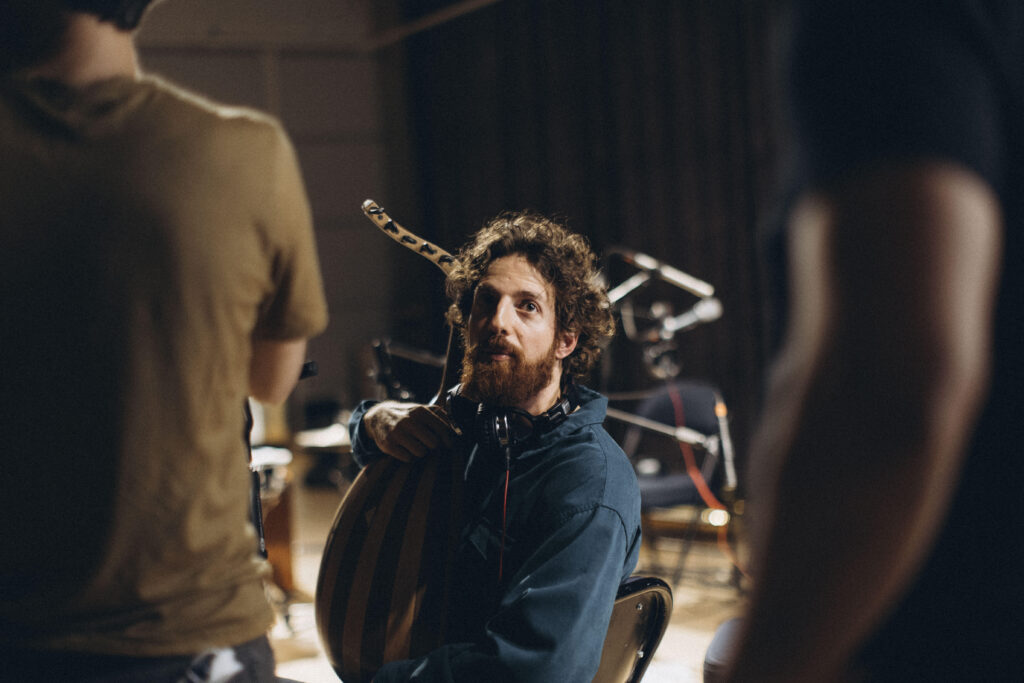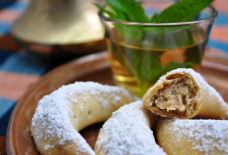"Music is the Glue": 40 Minutes with Hadi Eldebek

By: Layan Srour / Arab America Contributing Writer
Hadi Eldebek is an artist and educator committed to connecting his values and passions to his work in the arts, culture, and education in New York City. Born and raised in Lebanon, he draws inspiration from his roots while embracing opportunities to learn, explore, and engage with diverse cultures. He is committed to connecting his musical projects with culture through music and education.
What about your upbringing influenced your journey into music?
I was born towards the end of the Lebanese Civil War. My parents were forcefully removed from the south of Lebanon because of the Israeli occupation. During the Civil War, a portion of Lebanese people were working on bringing their country back up on its feet—liberating it from the invaders and gaining self-sovereignty. That was the general environment. There was uncertainty, there was hope, and there was wishful thinking, too, and that showed in art and culture.
I was lucky to have music playing on the radio often around my house. We had Fairuz and Umm Kalthoum, just like 99% of Lebanese people. I was more into the great productions in music, poetry, and literature from the previous times, the times of Umm Kalthoum, Mohammad Abdul Muttalib, Fairuz, the Rahbani Brothers, Sabah, and later on, Marcel Khalife and Ziad El Rahbani. All of these figures inspired me aesthetically, but also inspired me in terms of values. I always think about the notion of values because I see that our decisions, actions, and inactions are a function of our values. Musically and stylistically speaking, I like folk. I like the accessibility of these songs and how close they are to the people, land, and history. There’s a loose structure and a lack of elitism in it.

What is The Brooklyn Nomads, and how does the name reflect the group’s vision and cultural influence?
In 2014, while my friends and I were jamming, we thought we might as well make this a thing and share it with people. We agreed on the name—The Brooklyn Nomads. Brooklyn represents a symbol of diversity. You can find the whole world in New York City and Brooklyn. This nomadic value of crossing borders and exchanging inspired us to create this name.
My main influence at the time was the Silk Road Ensemble, which I was a part of for five years. The Silk Road Ensemble represented a world music ensemble, but a lot of it is rooted in Western classical traditions. I loved the diversity of instruments, sounds, and colors that I was surrounded with, and I wanted to create something like that. I wanted it to be rooted in our Arab culture, which is vast and stretches over two continents. We started by doing some covers.
How does your personal connection to Lebanese music shape the way you create music with The Brooklyn Nomads?
The sounds I consumed in Lebanon have a huge influence on the sounds I produce now. I can’t imagine separating myself from this. It’s like my sonic DNA. When I approach creating original music, I don’t start by thinking, “Now I want to make it Arabic” or not. I approach it as, “I’m feeling this emotion, and I want to bring out this sound.”
When we choose folkloric songs from the Arab world, we present them to the ensemble because we are a collective. The ensemble is not always the same. Sometimes we have five, sometimes ten musicians. Sometimes all five are from the Arab world, sometimes only two are. Each member brings their own unique element to the table, whether it’s with the Albanian accordion player, the Iranian violinist, or a Jamaican drummer. One thing we want to highlight is this foundation of universal bonding. We can all be together despite our differences—playing and creating something beautiful and moving in harmony. That is part of the message of The Brooklyn Nomads.
Have you encountered any challenges as an Arab navigating the music industry or society at large?
Initially, the challenge was finding my community and creating spaces that would welcome and embrace us. It didn’t take long for music to play its role as a magnet, attracting people from outside the Arab community who were drawn to good music and culture. The question was: how can we reach more people? How can we showcase what we have to offer to a wider audience?
It’s not just about the challenge of being Arab; it’s about the challenge of being an immigrant, adapting to a new culture, and learning how to navigate life in an unfamiliar place. Another significant challenge is being an artist. Creativity requires time, nurturing, and incubation. How do you find the balance between being an artist and surviving in an intensely capitalistic society?

What role do you think music plays in preserving or evolving cultural identity?
There’s no culture without music. Music is to culture what oxygen is to air. It’s that essential. How can you have a culture that consists of values, beliefs, and images of our land without music—the glue to all of this?
Music is the glue. It’s almost impossible to separate music from cultural identity. Music is cultural identity, alongside stories, literature, and everything else that people create. At the same time, identity is fluid—a topic that philosophers and ordinary people alike have struggled with for centuries. I sometimes wrestle with it myself. What am I, exactly?
I like to think that as humans, we all have different experiences, and we all have our own unique identities. The environment we grow shapes a lot of this identity. The experiences we go through shape the people we meet, whether they are from our community or not. At the bottom of it, we are all humans shaping our own understanding of who we are. Along the way, we find people with whom we share things in common, which gives us a sense of comfort.
What advice would you give to Arabs aspiring to enter the music world?
Be kind to yourself. Believe in yourself. Create what is meaningful to you, and know what truly matters to you. Music is not only about technicality, it’s also about your own experience and voice. The most beautiful thing I’ve experienced in the world of music is the connection with others and with myself. When I create something meaningful and true to myself, I often discover others who’ve been through nearly the same experience, and they’re deeply moved to know that someone else has lived it and chosen to share it.
The idea that “I’m not alone” is profound and powerful—you’re not alone in what you’ve experienced. Being able to express that is a deep connection with yourself and a continuous journey of self-discovery.
About the Article and Author: Layan Srour, a Lebanese musician based in Detroit, Michigan, is passionate about blending her culture through music, research, and education in the United States. 40 Minutes With is a weekly feature where Layan interviews an Arab American musician, exploring their journey through music and culture in America. Connect with Layan on Instagram, Facebook, LinkedIn, or via email.
Want more articles like this? Sign up for our e-newsletter! Check out our blog here!








